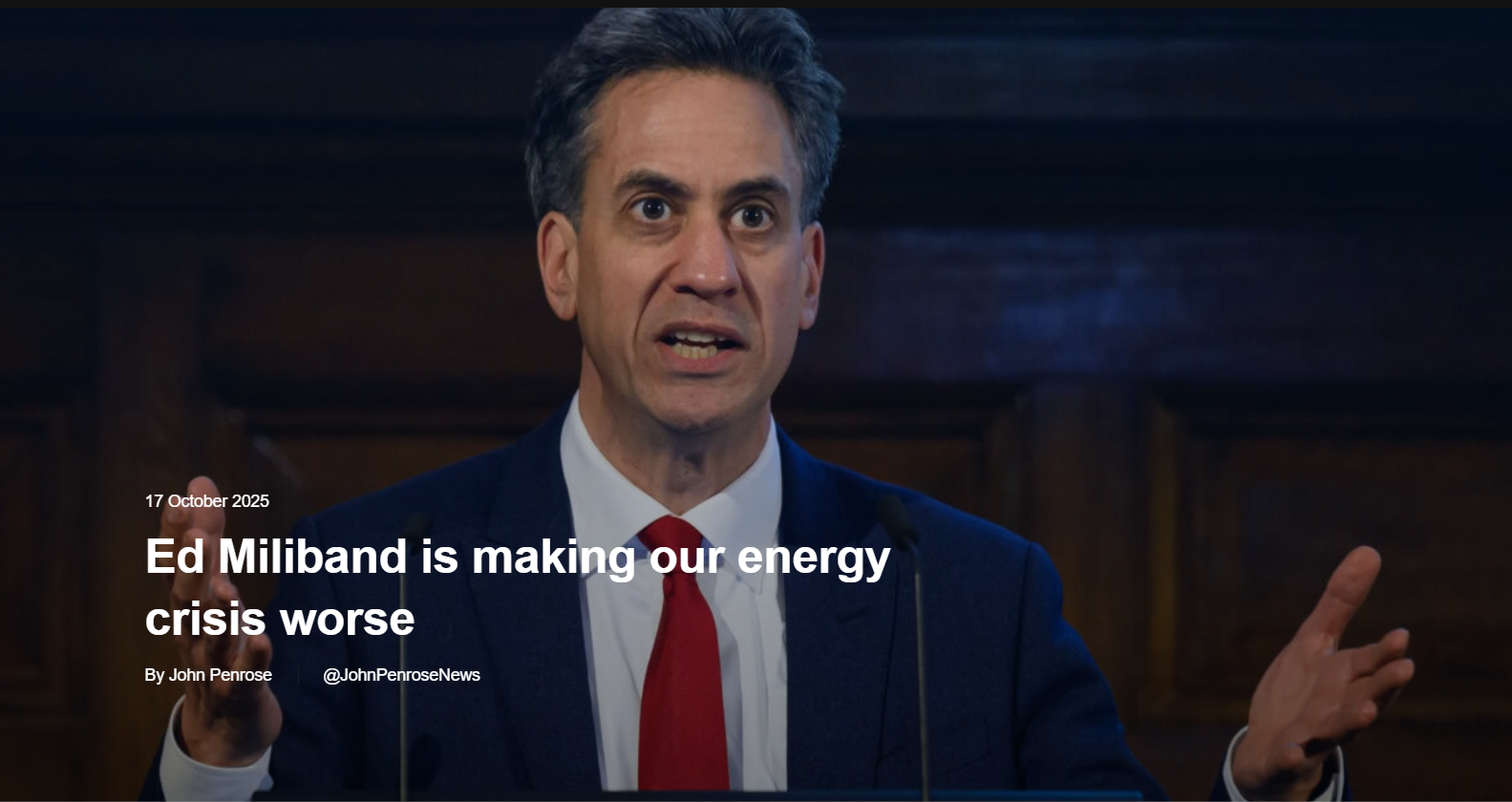This week the high priests of Net Zero on the Climate Change Committee told MPs that global temperatures are likely to rise by a lot more than 1.5 degrees, so we need to start adapting British buildings and infrastructure to cope with higher seas, stronger storms and hotter summers.

It’s a huge moment: official confirmation that the international Net Zero pledges which we helped broker aren’t stopping global warming the way everyone hoped. Even though Britain is one of the world’s leading decarbonisers, skyrocketing emissions from countries like India, China and the US have drowned the reductions we’ve achieved. And Donald Trump’s ‘drill baby drill’ policy is undermining things even further.
All of which leaves the UK with two enormous problems. The first is the extra costs of updating all our buildings and infrastructure to keep everyone safe from more extreme weather, which is money we wouldn’t have had to spend if the 1.5 degree target had been met.
The second is that, even though we’ve gone further and faster towards Net Zero than most other countries, Ed Miliband’s Climate Change Act locks us into doing it in an unjustifiably expensive way. Sky-high energy prices are wiping out the last of our heavy industry and making the rest of British manufacturing internationally uncompetitive too. Every UK factory closure means we import more from abroad, often from plants that emit more carbon from cheaper, but dirtier, energy sources than the ones in the UK they’re replacing. No wonder global emissions aren’t falling the way we hoped.
In other words, the Climate Change Act has turned decarbonisation into deindustrialisation. Instead of foreign governments asking how to copy Britain’s Net Zero success, they’re checking to make sure they aren’t repeating our mistakes. Failing to confront and solve this issue is one of the biggest black marks on the last Conservative government’s end-of-term report card, so if Keir Starmer and Rachel Reeves are serious about kick-starting economic growth, there are several steps they should take.
The first is to level the playing field for British manufacturing firms facing foreign rivals that use cheap but dirty energy and emit huge amounts of carbon in the process. Fortunately there’s a ready-made answer in the shape of a Carbon Border Adjustment Mechanism, which taxes imports made from dirty energy with lots of embedded carbon but leaves clean, green ones alone. We’re introducing one, along with South Korea and the EU, but ours is ugly and misshapen.
For a start, it leaves some manufacturing sectors out completely, which means the playing field isn’t being properly levelled at all. And it loads costs on to UK manufacturing exports, leaving them with huge financial disadvantages in countries that don’t price carbon like we do. Plus, Reeves is using it as a stealth tax by pocketing the receipts instead of ploughing them back into cutting energy levies or fuel duty instead. But these problems could be fixed fairly easily and, if they were, would drive a renaissance in UK manufacturing jobs, investment and growth. Green, low-carbon British products will become cheaper and more competitive compared to rivals from countries with a dirtier approach to energy.
Next, we’ve got to cut bills by rewiring UK energy markets so everyone can see the true like-for-like costs of low-carbon power that’s available when we want it, rather than only when the wind is blowing or the sun is shining. Once the real prices are transparently clear, some generators will turn out to be miles more expensive than we’d been willing to admit, and will slowly fold as their current contracts expire. But others will be cheap as chips and will grow like topsy as everyone switches over.
That’s because, once bill-payers are making decisions instead of politicians, they will naturally choose the cheapest low-carbon energy without being forced. Which means rafts of expensive and irrational red tape can be abolished too. The bossy bans on gas boilers in new-built homes won’t be needed anymore. We would also be able to wave goodbye to the moratorium on new petrol and diesel cars from 2030, or joining the – much pricier – EU carbon trading scheme too. North Sea drilling and UK coking coal mining can restart, because it’s daft to import them from less-green foreign suppliers when we emit less and save money by producing them ourselves. And we can save taxpayers a fortune by taking a flamethrower to all the expensive subsidy deals for politically-exciting but commercially uncompetitive generating technologies.
Last but not least, if we’ve got to update all our buildings and infrastructure to keep everyone safe from a more volatile climate, then we’d better change the rules that make Britain one of the slowest and most expensive places in the world to build.
That means updating our building regulations to handle extreme weather without compromising on safety, but also using the renewal process to demand an independently-audited £1-in-£2-out cut in the regulatory costs of every new requirement compared to the ones it replaces. It means pre-approved planning permission for things like energy grid connections on existing brownfield sites; electricity pylons alongside motorways and dual carriageways; rooftop solar panels on all buildings apart from listed heritage sites; and new nuclear generation on all previous nuclear sites. We need to repeal the planning rules which essentially ban air conditioning in new homes. It means implementing the Winser Review recommendations for building public infrastructure projects faster and more efficiently, and stopping gold-plating infrastructure with new government valuation standards so the costs and benefits of environment and safety protections always stack up. We must also introduce ‘Permit Passports’, where a previously-approved solution to a particular environmental or safety issue is automatically valid whenever an equivalent problem crops up anywhere else too.
The Climate Change Committee’s report that the planet will warm by a lot more than 1.5 degrees is very bad news indeed. But if it forces ministers to rethink and change course, there could be a silver lining to those more-violent storm clouds after all.
If you like this idea, you’ll find more details, soundbites and rebuttals about it under Energy That’s Cheap As Well As Green in the Policy Thumbnail section of our website
This article is the latest in a fortnightly series of policy proposals by John Penrose and the Centre for Small State Conservatives, published in CapX

Leave a Reply